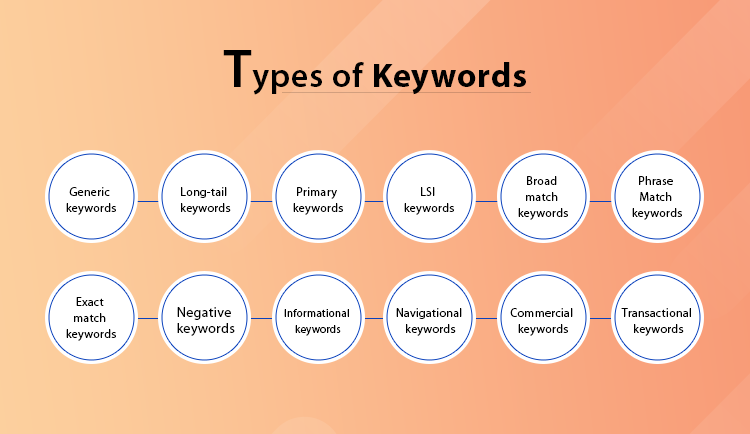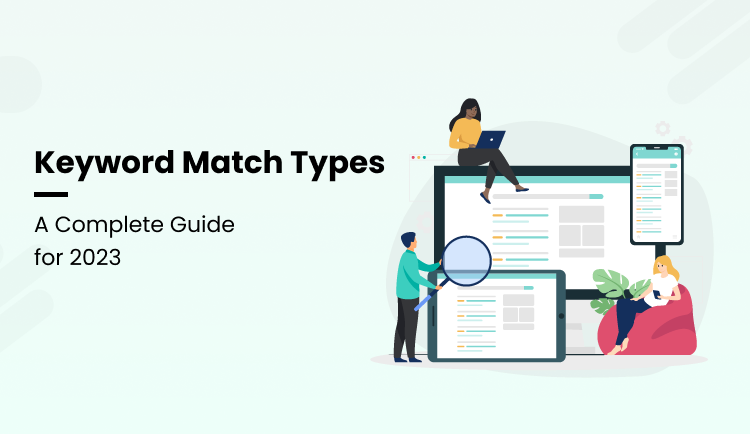
Detailed Guide to Different Types of Keywords
No matter how beautiful your content is, if it does not focus on the right types of keywords – all your efforts are in vain. Google ranks your web page based on the keywords you have used in your content.
Keyword research is critical for ranking high and driving organic conversions for your service or product. To rank well, you must first understand the different types of keywords and how to incorporate them into your content.
In this post, we’ll go over different types of keywords in SEO and how to use them to maximize your SEO efforts.
So, let’s get started…
Before we dive into the types of keywords, let’s understand what keywords are and why they’re important.
What Are Keywords?
Keywords are the words or phrases that people use while making an online search query. A keyword can be of one word or a phrase; they inform search engines about the content of a page on your website. Keywords play a crucial role when it comes to Google ranking.
Usually, whatever the internet users type into search engines to find the information they’re looking for falls into the category of Keywords. If a user’s search terms match those on your site, your website will appear in the search results. Hence, it is critical to find the right keywords for your content.
There are many different types of keywords used to address different search queries. Let’s now take a look at the different types of seo keywords.
Different Types Of Keywords To Optimize Your Writing Piece
1. Generic Keywords
Generic keywords are terms that describe your products or services extensively. They have a broader reach and help target people looking for something without having a specific brand or place in mind. Since they have a higher monthly search volume than specific terms, these types of keywords are more difficult to rank.
Example: “Bikes”
2. Long-tail Keywords
Long-tail keywords are typically longer and more precise search queries. These types of keywords in SEO receive a small number of monthly searches. Since these are precise keywords or users phrase their queries differently, these are only searched a few times per month.
These keywords receive less search traffic; however, they have a higher conversion value because they are more specific. Using long-tail keywords can help you get discovered by new audiences effortlessly.
Example: “Mountain Bike Service Center”
Or
“Remedies for glowing skin at home”
3. Primary Keywords
The primary keywords are the words for which you want to rank. These are high-volume search terms that can drive a significant amount of traffic to your site.
For a positive outcome, it is advised to have your primary keywords spread throughout the text on your site. Doing so sends clear signals to search engines and audiences that the page is about that particular product or services
Your primary keywords should appear in the title, Meta Description, headings, anchor links, alt text, and first and last Paragraphs. A maximum of 2-3% primary keywords should be included per page.
These types of keywords are used to target specific search queries to help web pages rank higher in the search results. Using primary keywords strategically assists you in increasing your search traffic and ranking for that content and keyword. You can use keyword search tools to find the best primary keywords for your content.
Example: “Mountain Bike.”
4. LSI Keywords
LSI Keywords (Latent Semantic Indexing), also known as related keywords, are words or phrases that share the same context or are semantically associated. These types of keywords are important for SEO, as they help sort sheep from the goats.
These types of keywords are used to provide context for a primary keyword in a particular content. Each web page should have one primary keyword and three to four related keywords to rank better on search engines.
Example: If the primary keyword is “Mountain Bike,” then the related keyword can be “Best Mountain Bike,” “Mountain Bike Reviews,” and so on.
5. Broad Match Keywords
Broad match keywords are a type of Google Ads Keywords. These types of keywords are often used in a Google Ads search campaign.
When you specify a term as a broad match keyword, Google is instructed to display your ad for any search that includes a variation of that keyword.
The ad will appear if someone searches for a similar phrase, singular or plural form, synonym, misspelling, stemming, or another related word for the broad match term.
Example: If the broad match keyword is “bike,” the Google Ad would appear during searches for terms like “Bike,” “Bike for Sale,” “Bike Store Near Me,” “Bike Stores,” etc.
6. Phrase Match Keywords
Phrase Match keywords are one of the Google Ad keyword types. These types of keywords include specific search phrases that are targeted on Google Ads search campaigns.
Having a phrase match keyword in the content makes Google display your ad only if a search query contains the exact phrase. The search query can have words before or after the phrase. However, the search query must contain the exact phrase for it to be displayed to searchers.
Example: If the phrase match keyword is “Mountain Bike,” the search query must have “Mountain Bike” along with other words like stores, sales, discounts, etc. The phrase match keywords could be “Mountain Bike Stores,” “Mountain Bike Sale,” “Women’s Mountain Bike,” etc.
7. Exact Match Keywords
A keyword setting that restricts your ad to only appearing when someone searches for your keyword or close variants of your keyword are exact match keywords.
Among the possible close variations are Misspellings, Singular or Plural Forms, Stumpings, Abbreviations, Accents, Paraphrases, Recorded Words, Stemming, or words that are closely related to the exact match keyword and have the same search query.
These keywords allow you to connect with people looking for your business, despite minor differences in how they search. These types of keyword matches reduce the need to create exhaustive keyword lists to reach potential customers.
Example: Whether someone is searching for [Mountain Bike] or “Bike for Mountains,” the search intent is the same; they’re looking for a mountain bike.
8. Negative Keywords
Negative Keywords are any keywords that prevent your ad from being activated by a specific word or phrase. These keywords have nothing to do with the ad copy, target page content, or offer. They may be related semantically, but they have nothing to do with the ad core principle.
These phrases or words are intentionally excluded from Google Ads search campaigns. They are different versions of broad match, phrase match, and exact match keywords that you instruct Google to exclude from your campaign. Negative keywords prevent your ads from being displayed to people searching for that phrase.
Example: If you add “Discounted” as a negative keyword to your campaign, you instruct Google not to show your ad for any search query that includes the term “discounted.” If your broad match keyword is “Mountain Bike,” the negative keyword could be “Discounted Mountain Bikes.”
9. Informational Keywords
Informational keywords are words or phrases that users use to gather information about a particular subject. These keywords frequently contain question words, such as “what is,” “how to,” and so on.
When users know what exactly they want, they use informational keywords. They are aware that they have a requirement or a problem, and they use informational keywords to find a solution. When searchers use informational keywords, they intend to find a specific answer to a question or general information.
These types of SEO keywords convey less intent to take action. However, they can help raise brand awareness by targeting the audience with informative content and educating them. Targeting these types of keywords in SEO can help you become an authority in your niche.
Example: “Can mountain bikes be used on paved roads?” Or “Which is the best mountain bike to buy?”
10. Navigational Keywords
Navigational keywords are very important for any business website. Customers use these tpes of keywords topeople are used to locate a particular brand, website, or location. Customers use these types of keywords when their intent is clear or they’re in the consideration stage of the purchase funnel.
They search for various brands to determine which one provides the best solution to their needs.
Example: “Decathlon Mountain Bike”
Optimizing for these types of SEO keywords is difficult because navigational queries are always brand or location-based. However, following the steps mentioned below can help you improve your visibility for brand-related queries:
- Have your brand name in your title tag and content.
- Improve your Google My Business page’s navigational queries.
- Use social media handles to secure multiple ranking positions for your brand name.
- Improve your visibility for brand-related queries by using Google advertising.
11. Commercial Keywords
Keywords with high commercial intent are referred to as commercial keywords. Usually, these types of keywords are used to entice potential customers to buy what you sell.
Customers whose intents are explicit; who knows what they want, look for websites that lure them with their offerings. Hence, it is crucial you use the right keywords. For that, performing the right keyword research is essential.
You can target that keyword with a piece of content, such as a checklist. Content marketing aims to get in front of the customer early and make a good impression.
Example: “Affordable Mountain Bike”
12. Transactional Keywords
Transactional keywords, also known as “action” keywords, are words or phrases that potential customers use to find products/services they want to buy.
Customers already know what they want to buy, and they use precise keywords to help them find the best place to buy it. Transactional keywords include terms such as buy, affordable, purchase, discount, cheapest, for sale, where to buy, and offer.
Example: “Where to buy the best Mountain Bike.” “Deals on Decathlon Mountain Bike,” and so on.
Summing up…
So, these are the 12 types of keywords that you need to know to create a more informed and strategic marketing plan. They may appear daunting at first, especially when you’re new to SEO. But these keywords can be a game-changer in your marketing strategy!
All of these Google keyword types can assist you in determining the best keywords for your content, connecting with your target audience, driving search traffic, and increasing conversions. So, make the best use of keywords!!




